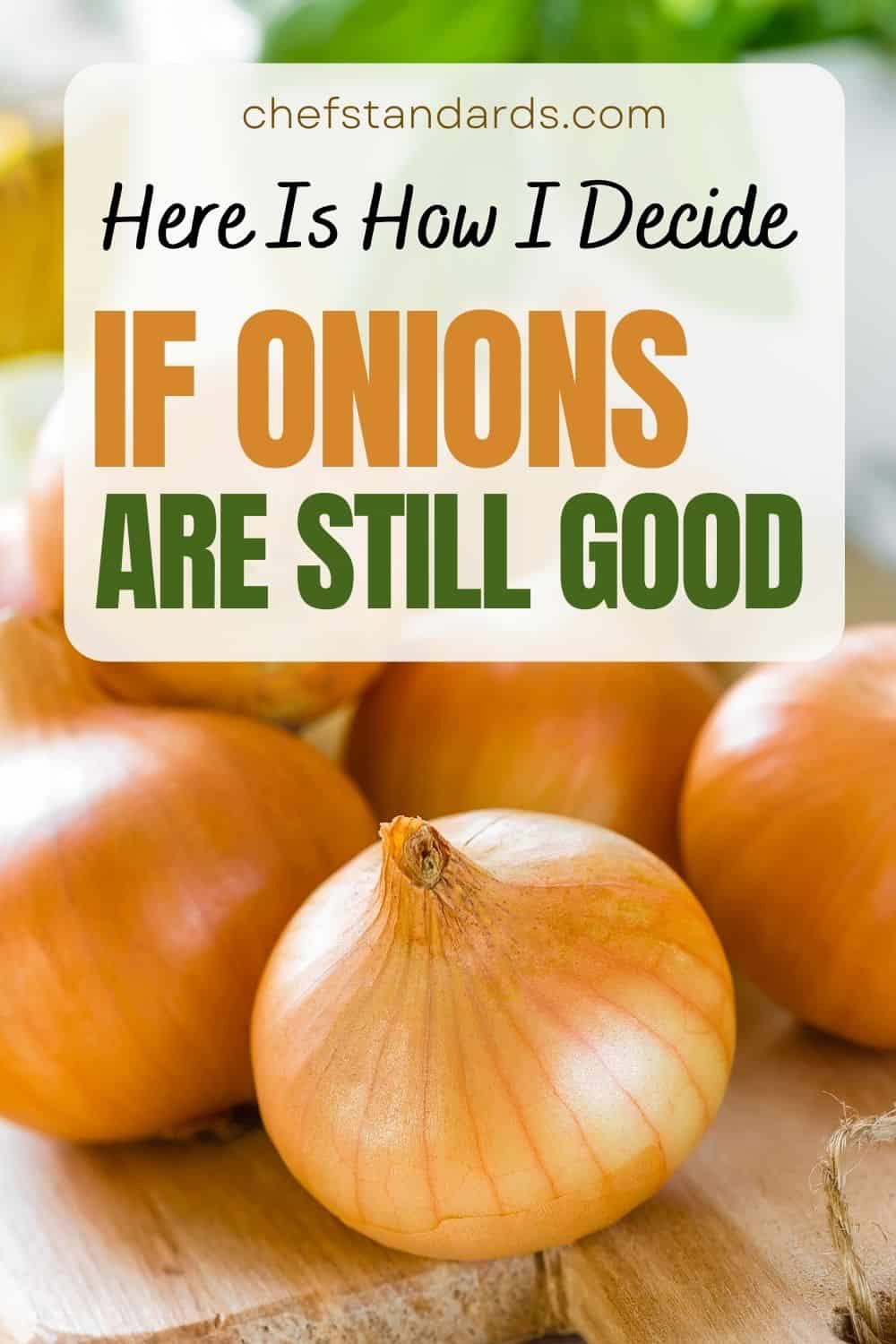Every time I buy more onions than I need, the first thing that comes to my mind is: “Hell yes, these onions will last forever!” In 50% of cases, it turned out that I was wrong because the onions got spoiled and I couldn’t use them any longer.
Before accepting the fact that they are spoiled, I usually tap into the overthinking mode: “Nah, these onions are still good. It’s just that their color changed slightly.” But when I smell the onion, I literally faint from its putrid smell which indicates it’s 100% spoiled.
The nose, reader. The nose never lies.
How many times has this happened to you? I bet one too many. CLICHE ALERT: From today this will be a thing of the past.
We’ll go through the main signs of rot in onions and I’ll also share with you some secrets on how to store it properly to prevent spoilage.
Ready?
7 Signs An Onion Has Gone Bad
Has your onion gone bad or are you just imagining things? Sometimes, it’s not easy to tell when the onions are spoiled. That’s why we have signs that can tell you if an onion is bad:
1. Smell
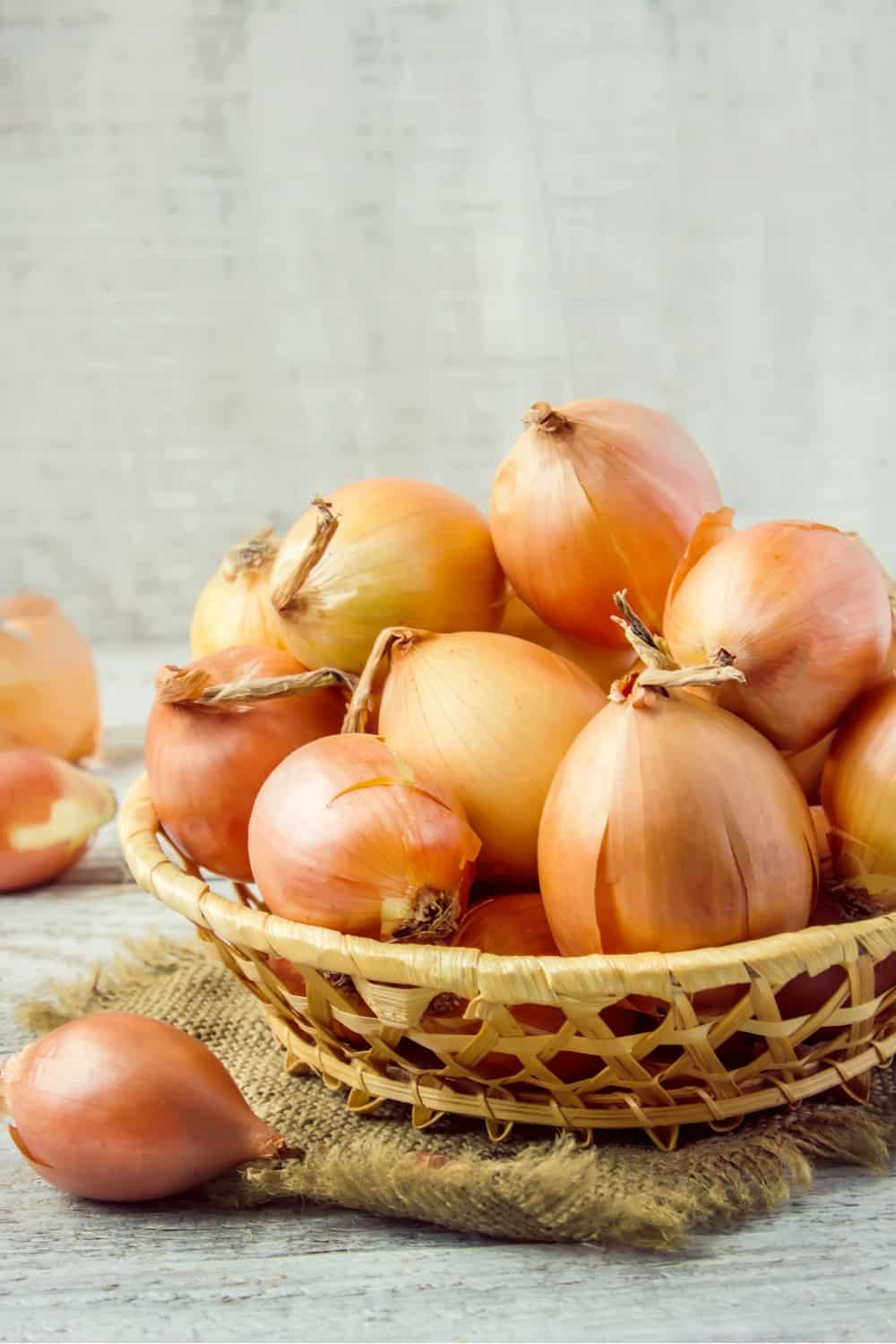
The smell of an onion is a good indicator of whether it is still fresh or not. If the onion has a strong, sharp smell that makes you want to cry, then it is still fresh.
If the onion has an acrid smell or smell that resembles ammonia, then it’s probably gone.
Pro tip: Don’t forget to do the sniff test before consuming an onion that you aren’t sure whether it’s spoiled or not.
2. Dark spots
The dark spots on the onion are a definite sign that it is bad. The dark spots are caused by the onion’s natural reaction to bacteria.
If you notice a dark spot on your onion, it is best to discard it and get a new one. If you don’t have any onions left or want to minimize waste, you can also cut off the dark spot and use the rest of the onion.
NOTE: If you combine an onion with an alkaline element, it may turn blue. A blue onion is not an indicator of spoilage.
3. Soft spots
The soft spots on your onions in general are one of the first signs of spoilage. So, if you notice any soft spots followed by a slimy texture on an onion, then you can be sure that it’s starting to decay.
4. Excess moisture
If you notice that your onion is too moist to cut or slice, it’s probably time to throw it away. Harmful bacteria can grow on an onion that has excess moisture, making it unsafe for consumption.
5. Sprouting
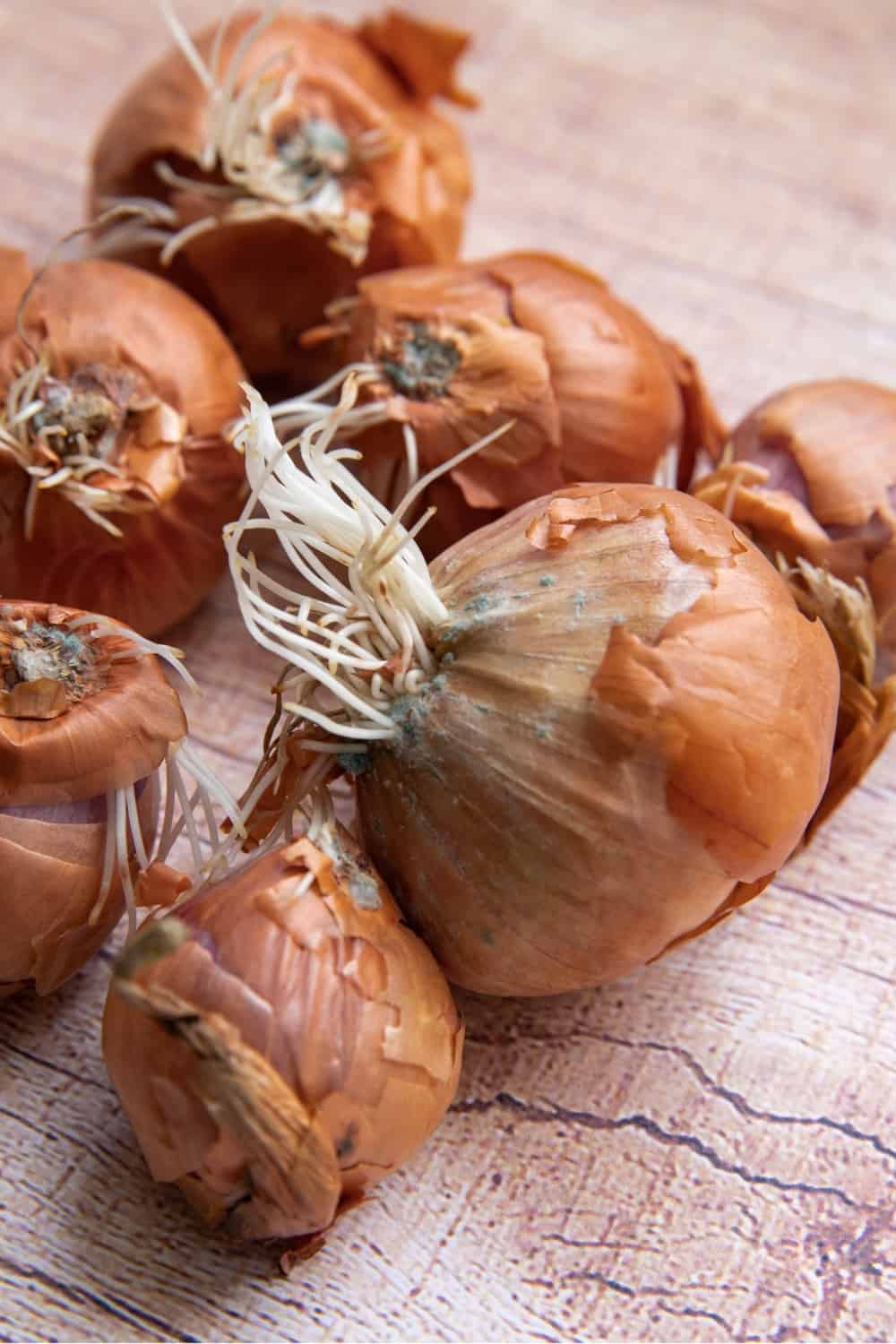
Another sign that onions might not be fresh enough is if they start to sprout or grow moldy roots at their base. This will cause them to emit a foul smell as well as taste unpleasant. Trust me, you don’t want to use such an onion as a side for sandwiches.
6. Mold
Check if there is any white, green, or black mold on or around the bulb. Also, check if there’s any mold on wilting leaves on top of the bulb. If you notice any mold in these places, then that means an onion has gone bad, and you should discard it immediately.
7. Tears or holes in the skin
Look at the skin of the onion. If there are any tears or holes in the skin followed by the above signs of spoilage, then chances are this onion is not good anymore.
Pro tip: Don’t rely only on one sense when determining whether an onion is spoiled or not. Use your hands, eyes, and nose because they never lie.
How Long Do Onions Last?
This depends on whether the onion is cooked, peeled, or unpeeled, and where it is stored. You can keep onions at room temperature, in the refrigerator, or in the freezer. Let’s see the shelf life of each storing method as shown in the table below:
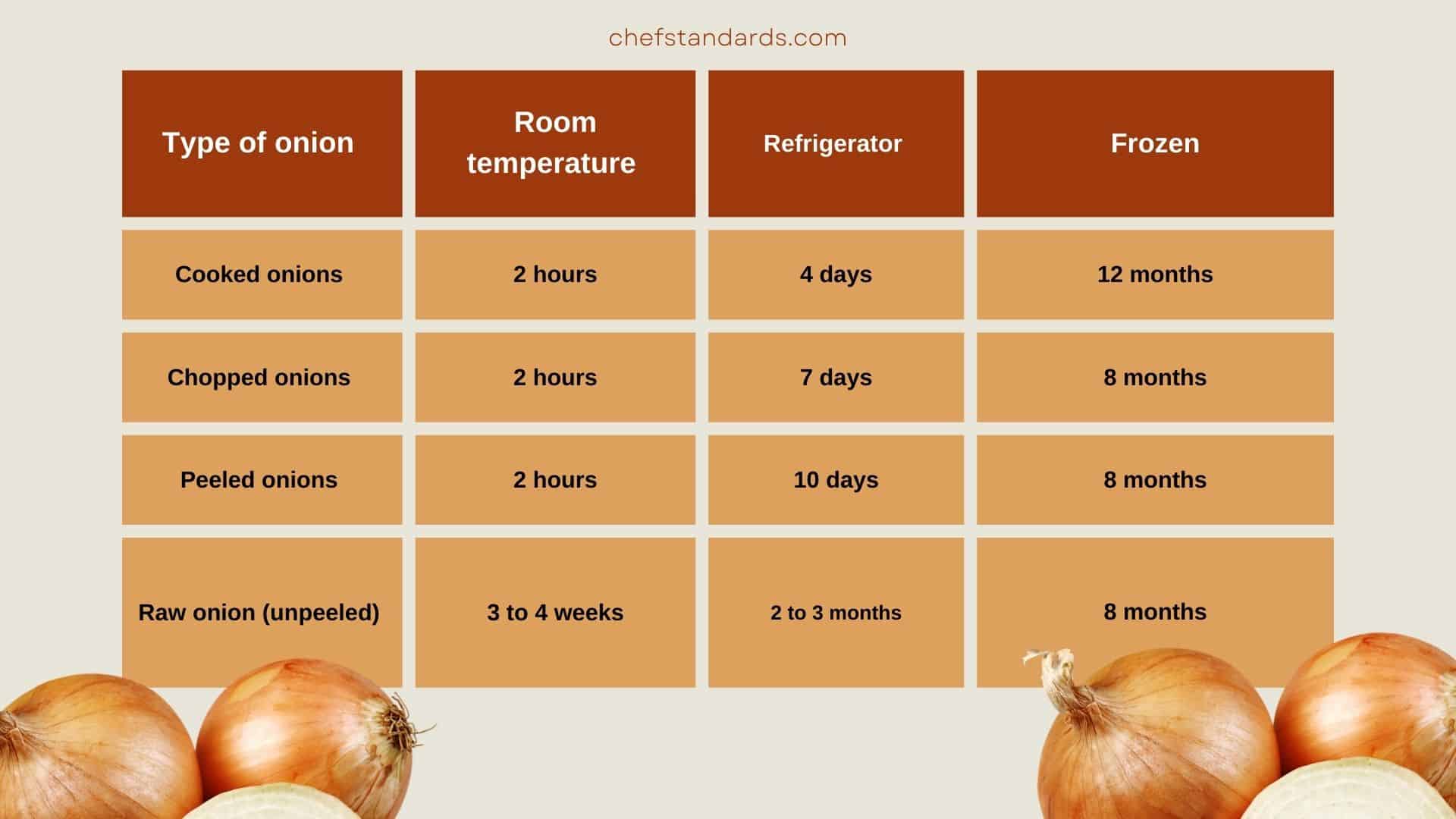
NOTE: The USDA recommends the following: “Within 2 hours of cooking food or after it is removed from an appliance keeping it warm, leftovers must be refrigerated. Throw away all perishable foods that have been left at room temperature for more than 2 hours.”
6 Tips For Storing Onions To Prevent Spoilage
You can check the signs of spoilage of an onion, but do you know what’s even better? Learning all tips and tricks regarding storing onions because this will help you prevent spoilage. If you want to extend the shelf life of your onions, then do the following:
1. Keep the onions away from light: Exposure to light can accelerate the onion’s spoilage, so keep it away from light.
2. Fridge is the best storage option: Storing onions in the refrigerator or in a cool, dark place will preserve their freshness for a long time. Use your refrigerator vegetable section for a longer shelf life.
3. However, you shouldn’t keep them too long in the fridge: Onions can develop soft texture and moisture spots if you keep them in the fridge for more than a few weeks.
4. Cold cupboard is also an option: Use cold cupboards or storage rooms to keep your onions at a cool temperature in a resealable bag or mesh bag for food storage.
5. Keep onions away from potatoes: This goes for both sweet onions, yellow onions, and other types of onions. Why? Because keeping onion next to potatoes will make your potatoes produce sprouting, and raw onions spoil faster.
6. Use an airtight container: Of course, it is best to store your onions in an airtight container in the fridge, which will prevent the onion smell from escaping and extend their shelf life. You can also use plastic bags for peeled onions.
Just In Case: Can You Get Sick From Eating A Bad Onion?
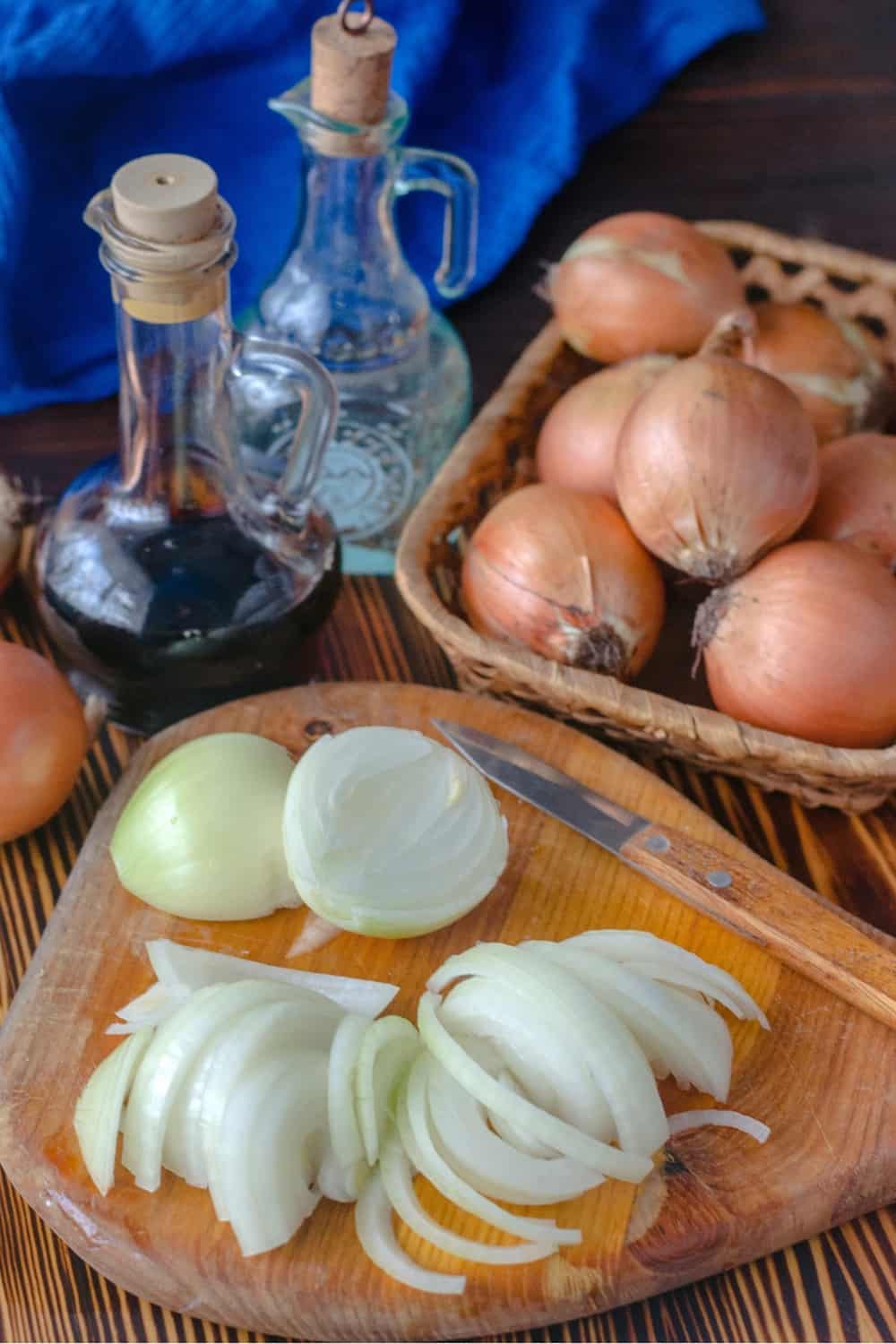
Okay, let’s say that you ate a spoiled onion because you couldn’t determine whether it was bad or not. Or because you didn’t want to discard a bad onion even though you knew it was spoiled.
What can you expect to happen?
You won’t die for sure. But you may experience nausea and stomach problems. Also, an unpleasant taste in your mouth will last for a few hours.
Additionally, bad onion will also alter the taste and smell of your dish. In other words, the food will taste and smell bad.
Pro tip: If you eat a bad onion, take a break from kissing anyone because bad onions can cause bad breath.
That’s It, My Friend!
Remember, if your onions look and smell unusual, then they’re likely spoiled and you shouldn’t risk consuming them. Buying onion in moderate amounts is one of my life goals for this year and I’ve been doing it good so far.
What about you? Do you buy more onions than you need only to watch them rot before your eyes? Will you incorporate any of these onion-storing tips into your daily life?
Hint: I’m sure you will.
